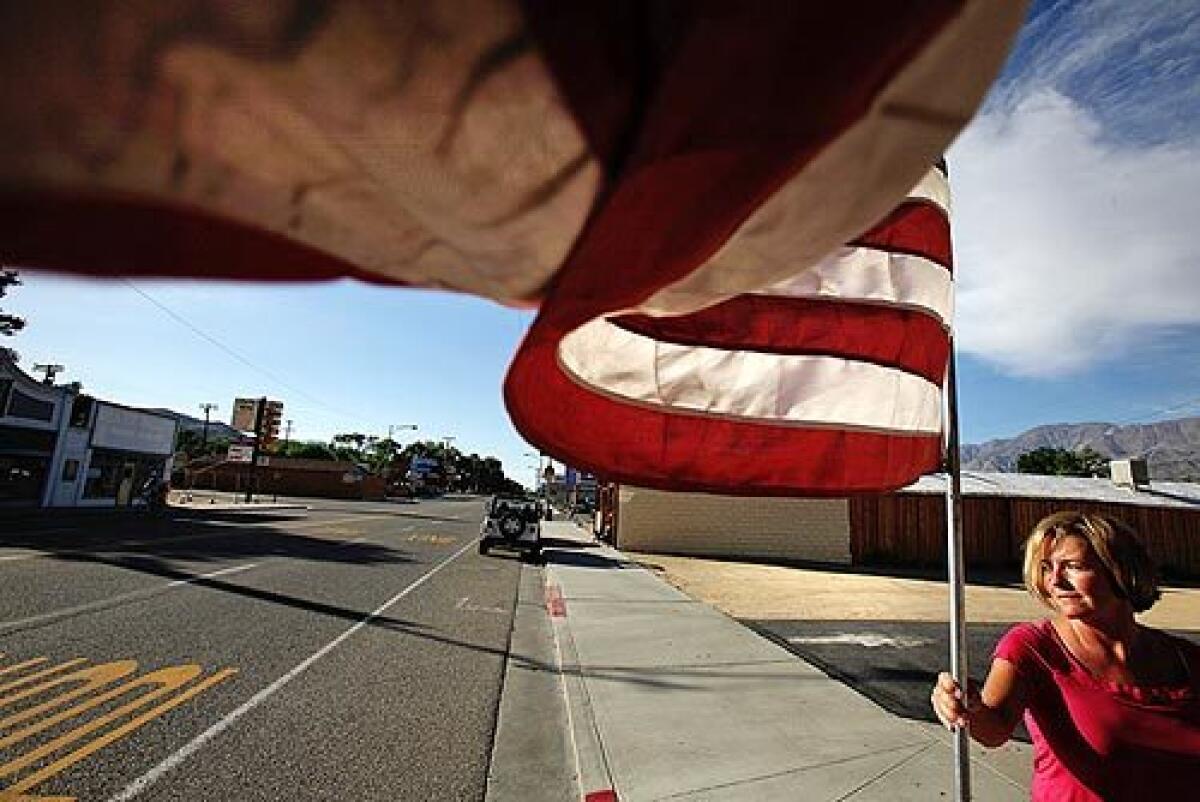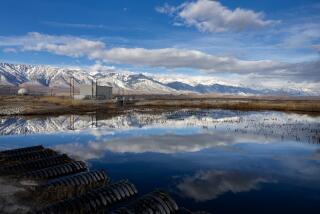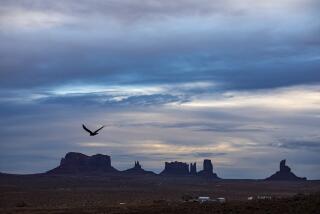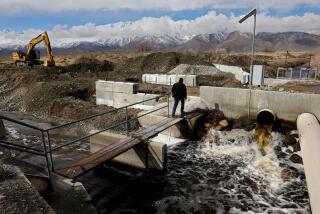In the Owens Valley, resentment again flows with the water

The Los Angeles Department of Water and Power is quietly prospecting once again for land and water rights in the Owens Valley, sparking tense disputes among residents over the agency’s influence on their economic stability.
Unlike previous battles between Owens Valley residents and the DWP, which focused on the environmental and economic damage caused by L.A.’s pumping of local water supplies, the current campaign seeks to break the agency’s grip on land the locals say is needed for commerce, hospitals, parking and affordable housing along a 112-mile stretch of Highway 395 east of the Sierra Nevada.
“Sustainable communities -- that’s what they are sucking out of this place along with our water,” said Scott Palamar, a photographer who moved to Lone Pine in July after his Malibu home was destroyed by a brush fire in 2007. “The DWP only wants just enough infrastructure to support its own operations. Beyond that, they don’t seem to care.”
The trouble started when a local real estate broker learned that the DWP, which already owns 25% of the Owens Valley floor, plans to buy 100 acres of privately held stream-side property just west of Independence, the Inyo County seat, for an estimated $4 million to $5 million.
On May 6, a group of Owens Valley residents sent a petition to Los Angeles Mayor Antonio Villaraigosa and the Los Angeles City Council urging them to force the DWP to compensate for the loss of this private land by releasing an equal amount of its own holdings elsewhere.
“They are creating a net loss of private land in Inyo County and destroying our towns in the process,” said Jenifer Castaneda, a Lone Pine real estate broker and community activist who helped write the petition. “If they are going to take what little available private land there is left in the valley out of circulation, they should make an equal amount of land available in communities that are struggling to survive.”
“I understand their sentiments” and “I’m open to having conversations” about releasing property, DWP General Manger David Nahai said in an interview.
But he also pointed out that three years of drought, cutbacks in state water allocations and rationing and its $500-million dust-mitigation project at Owens Lake have left the agency trying to cope with “a seriously overburdened water supply.”
The DWP already receives water from the 100-acre parcel it is attempting to purchase. By acquiring ownership of the land and its water rights, the agency would maintain permanent, uninterrupted access to the water and prevent other parties from tapping it for development or selling it elsewhere.
In the meantime, the communities of Olancha, Lone Pine, Independence and Big Pine continue to deteriorate, with most of their developable land controlled by the DWP.
In Independence, a town of 500, the sole grocery store recently closed because its customer base had dwindled. About 15 miles south in downtown Lone Pine, the DWP last summer demolished several buildings it owned on a single block, leaving behind three gravel-covered lots locals have dubbed “the missing teeth of Main Street.”
“That lot was an auto parts store. That one nearby was a beauty shop, and that one over there used to be a Radio Shack,” Castaneda said on a recent weekday, pointing to the empty parcels. “Now, people are wondering: What is the critical mass needed to sustain this community?”
Twelve years ago, the DWP agreed to relinquish 75 acres in the Owens Valley for residential and commercial uses, and the county amended its general plan to ensure that land exchanges did not result in a net loss of tax base or revenues.
So far, however, only a handful of lots from those 75 acres have changed hands because the DWP tends to set minimum bids far above market value.
Nahai acknowledged the problem: “We are right now reappraising the 75 acres with a goal of bringing them to market soon in a successful auction.”
The Owens Valley has been a colony of sorts since the early 1900s, when L.A. began pumping so much water via the Los Angeles aqueduct system that it was all but impossible for the region’s early farmers and ranchers to make a living -- a scandal dramatized in the classic 1974 film “Chinatown.”
Owens Valley residents and the DWP have been at odds ever since over the effects of L.A.’s water use on the landscape. But the dissension flared anew when Palamar and Castaneda revealed the agency’s offer on 100 acres at Oak Creek owned by Alan Bell of Woodland Hills and his brother, Robert Bell of Bishop.
The two DWP critics were publicly chastised by an Inyo County supervisor for disclosing details of the transaction.
Some of Robert Bell’s neighbors say he should subdivide the property to increase its value. Others argue the DWP is offering too little for it.
Robert Bell, who was a construction worker for the DWP until he won a $9-million lottery jackpot in 1988, declined to comment on the land or his decision to sell it, citing confidentiality agreements. “I can talk about it later,” he said. “Not right now.”
County officials and residents say the DWP also has expressed interest in acquiring an 80-acre site with water rights in Big Pine, as well as at least one parcel with water rights adjacent to the Bell brothers’ property.
The last time the DWP bought a chunk of land larger than 100 acres with water rights was in 1986, a department spokesman said.
Three weeks ago, Nahai said he visited a group of Owens Valley cattle ranchers who receive significant DWP water allotments, “to talk with them about our dire water situation.”
The last time the DWP curtailed water allotments for valley ranching and agriculture was during the drought of 1991.
Some residents view Castaneda and Palamar and dozens of others who signed their petition as heroes for daring to take their case to the Inyo County Board of Supervisors and Los Angeles City Hall.
Said Inyo County Supervisor Marty Fortney, who operates a camping and fishing resort on land leased from the DWP: “If they can get DWP off the stick to release some of its land at a reasonable price, then more power to them.”
“But forcing the DWP to do anything around here is like trying to squeeze a bull through a window -- probably ain’t going to happen,” he said with a smile. “In this country, the DWP is God, and it makes the rules.”
Castaneda agreed -- to a point.
“If people don’t speak up,” she said, “there won’t be any businesses or livelihoods left to fight for.”
More to Read
Start your day right
Sign up for Essential California for news, features and recommendations from the L.A. Times and beyond in your inbox six days a week.
You may occasionally receive promotional content from the Los Angeles Times.







